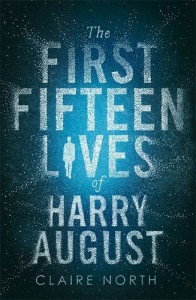The First Fifteen Lives of Harry August by Claire North

The First Fifteen Lives of Harry August reminds me greatly of Doctor Who. There are 3 possibilities:
1) I am that kind of a fangirl. Everything reminds me of DW.
2) It is merely a coincidence.
3) It really does have a lot of similarities.
Judge for yourself.
(Background knowledge of DW is not required to read this review).
----------
The story began, like many time-travel stories do, at the end:
I am writing this for you.
My enemy.
My friend.
You know, already, you must know.
You have lost.
The facts are these:
- It is two of them against the world.
- A maniac causing the destruction of the world before its time; vs
- A madman trying to save it, because he is the only one who could.
- A story spanning multiple lives/incarnations.
They could be Harry August vs [identity is a spoiler] or they could be the Doctor vs the Master.
Just saying. To continue:
“The world is ending,” she said. “The message has come down from child to adult, child to adult, passed back down the generations from a thousand years forward in time. The world is ending and we cannot prevent it.
Time travel in this story is not the usual kind of time travel to the future or past via time machine/device or special powers involving travelling through time or whatnot. It works, instead, like this:
There are people, living among us, who do not die. It says that they are born, and they live, and they die and they live again, the same life, a thousand times.
I had been born again exactly where I had begun, back in the snow, back in England, back in the past where it had all begun.
Fortunately, there is the option of living it differently. Harry August lived a very varied first fifteen lives, and narrated the differences and similarities of each. After all, being forced to live the same life in exactly the same way, repetitively, would be so tediously boring. But when people like him make different life decisions, doesn’t it affect the world, or does the world, so to speak, compensate around them?
“In every life we lead, regardless of every death we pass,” I said, “the world around us is unchanged. There is always rebellion in 1917; there is always war in 1939; Kennedy will always be shot and trains will always be late. These are linear events which do not vary, as far as we can observe, from life to life. The only variable factors are us. If the world is changing, we are the ones who change it.”
The concept of time being in flux vs fixed points in time. Fascinating.
Also, for anyone to whom this may concern:
This book is not to be read for romance. Although there is a little, a very little, of it:
Run away with me, I said, just for a night. The world will turn, all things will end, and people forget.
It did not work out, of course. But that’s because she was not the sort of woman who believed that there are more things in heaven and earth than are dreamt up in the philosophy of men (quoting Shakespeare now, I am) It’s not her fault she was linear and had only one life.
----------
And finally I attach, if only to commemorate it, a discussion between two people living their non-linear lives, under the guise of the professor and the undergraduate student; on the theoretical effects of time travel. It’s nothing you wouldn’t have heard of before if you’re accustomed to the time travel aspect of the science fiction genre, but I like it anyway. Not a spoiler, but under a cut due to its length:
(show spoiler)


